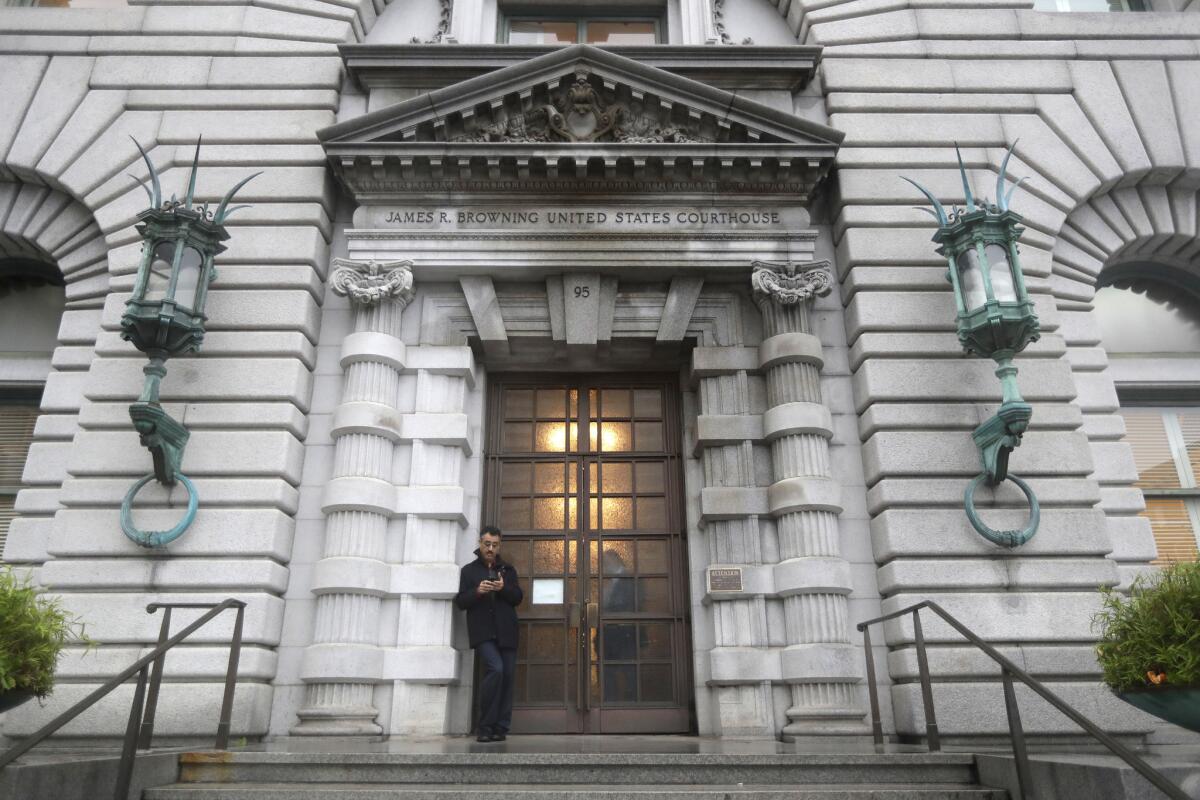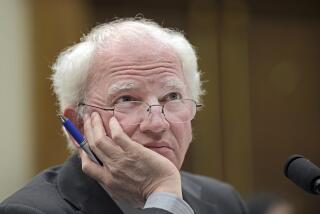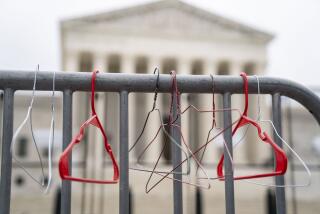Newsletter: The changing makeup of the ‘nutty’ 9th Circuit

Good morning, and welcome to the Essential California newsletter. It’s Friday, Dec. 13, and I’m writing from Los Angeles.
Start your day right
Sign up for Essential California for news, features and recommendations from the L.A. Times and beyond in your inbox six days a week.
You may occasionally receive promotional content from the Los Angeles Times.
There are the big, noisy political developments — and the quiet ones. But both matter.
This week, the world watched as articles of impeachment against President Trump were introduced in the U.S. Congress and met with hours of withering debate. But something else also happened in the Capitol this week that could affect California, and other western states, for decades.
This week, the U.S. Senate confirmed two more Trump nominees to the 9th U.S. Circuit Court of Appeals. The 9th Circuit is the nation’s largest appellate court, and one long regarded as a liberal bastion. (The reality of that reputation has starkly waned in recent years, but more on that below.)
Judges Lawrence VanDyke and Patrick Bumatay, who are both in their 40s, will serve lifetime appointments. Their ascent to the bench means that Trump appointees now account for more than a third of the active judges on the very same court that the president once characterized as “a big thorn in [his] side” and “a complete & total disaster.”
What is the 9th Circuit?
The 9th Circuit is a court of appeal with jurisdiction over nine western states and two Pacific Island territories — an area that spans roughly 1.4 million square miles and encompasses more than 60 million people. Most of those cases are decided by three-judge panels, with those three judges chosen at random.
The court wields a great deal of influence over the law of the land for those in its jurisdiction. Think of it this way: Yes, the Supreme Court is the last word. But the Supreme Court hears only about 100 to 150 of the more than 7,000 cases it is asked to review every year. So for the vast majority of disputes, the decision of the circuit court functions as final say. (The same can be said for all 13 circuit courts — the 9th is inherently no more powerful, it’s just a whole lot bigger.)
The 9th Circuit has been responsible for a plethora of contentious decisions over the years, including a ruling that the mention of God in the Pledge of Allegiance violated the Constitution. That ruling was overturned by the Supreme Court.
How did the 9th Circuit come to be so liberal in the first place?
The answer is simple: Jimmy Carter. A 1978 expansion of the courts added 10 seats, which were Carter’s to fill — with a Congress controlled by Democrats to back his choices. The regular cycle of judicial retirements, deaths and appointments meant that Carter was responsible for 15 total appointees to the court.
In the natural order of things, four to eight years of a Republican presidency are typically followed by four to eight years of a Democratic presidency (or vice versa), and the shifting pendulum of political appointments accounts for something like rough parity in the judicial makeup. But the Carter-era expansion of the court was “essentially an external shock to that system,” according to Jon Michaels, a professor of law at UCLA. His appointments remade a court that had previously been relatively conservative.
And Carter didn’t just choose liberal judges, he installed some of the most liberal judges to ever serve on an appellate federal court — like Judge Stephen Reinhardt, who remained a crusading force until his death in 2018, or the late Judge Harry Pregerson, who famously played a key role in attaching a vast array of social programs to the construction of the 105 Freeway.
These were men who “approached the judicial role as one where the job was not merely to apply the law as written by the legislature, but also to help balance economic and power disparities in the legal process,” according to lawyer Ben Feuer, who serves as chairman of a firm that specializes in California appellate cases. Under their leadership, the 9th Circuit often issued rulings that not only made headlines but also carved out its place in the popular imagination as an activist court.
That was a long time ago. Is the “nutty 9th” reputation still true?
Not for a while. The court still leans liberal, but without the fervency of its past.
Feuer posits that this is, at least in part, due to a general trend of the judges appointed by Democratic presidents shifting more toward the center over the last few administrations, while Republicans have continued to appoint judges who are consistently, if not increasingly, conservative. And the Carter-era liberal lions are no longer on the court.
But even with all that said, the makeup of the court has still changed drastically during the Trump years.
As recently as April 2017, judges appointed by Democratic presidents outnumbered Republican appointees on the court by about 2 to 1 (that number probably also includes semi-retired senior-status judges). The court is now edging toward a more even split, with a ratio of 16 Democrat-appointed active judges to 13 Republican-appointed ones.
What does all this mean for the future?
California, as you well know, has a reputation for forging its own progressive path. The ability to occasionally go a bit rogue, and operate independently from the rest of the nation is made possible in part by the sheer size of our population and economy. But California has “also been able to insulate itself a little bit, because there have been federal challenges that have been brought in courts that have generally been sympathetic to progressive regulation,” Michaels said.
“So, that may change” the UCLA law professor continued. “This might be a time where California is less able to chart a more exceptional route within the country.” But, he explained, all of that depends on what happens next. If Trump wins another term, we could see the courts further remade — with the potential for a 9th Circuit that ultimately leans toward the right.
And now, here’s what’s happening across California:
TOP STORIES
For Armenian Americans, Congress’ recognition of their genocide is just part of the battle. The House on Oct. 29 voted 405 to 11 to designate the killing of an estimated 1.5 million Armenians as genocide. Yet the Senate resolution had stalled three times before coming to a vote. But on Thursday, the measure recognizing the mass slaughter as a genocide was approved unanimously by the Senate, a rebuke to President Trump, who had sought its delay, and to Turkish President Recep Tayyip Erdogan, who had lobbied the White House to block the designation.
In Southern California, home to an estimated 200,000 Armenian Americans, the largest community in the U.S., many in the diaspora say that the fight for recognition of the genocide, though not the sole unifying force, binds Armenians across the globe. Los Angeles Times
How might California be shaped by a devastating earthquake? The answer lies an ocean away in the city of Christchurch, New Zealand, eight years after a huge quake killed 185 people. For residents, the physical, economic and psychological aftershocks continue today. Christchurch shares many of the same qualities and dangers of Los Angeles, San Francisco and other California metropolitan areas sitting along major faults. Los Angeles Times
Sen. Bernie Sanders has endorsed a controversial candidate in the race for Katie Hill’s California congressional seat. His choice — Cenk Uygur, founder and co-host of “The Young Turks” online talk show — has a long history of making crude and degrading comments about women and provocative statements about Jews, Muslims and other groups. Los Angeles Times
L.A. STORIES
L.A. County and Planned Parenthood will open 50 high school sexual health and well-being centers. The effort, which will cost at least $12 million in its first year, is designed to bring much-needed health and wellness care to underserved teenagers. It comes at a time when Los Angeles and other districts are struggling to meet the basic needs of their students to help free them to focus on learning. Los Angeles Times
Where do L.A.’s Christmas trees come from? Chances are that Douglas fir in the living room wasn’t grown locally. Curbed LA
How actress Reese Witherspoon built an empire: Her 3-year-old company, Hello Sunshine, now has tentacles in television, film, podcasts and publishing, with an online book club “poised to one day rival Oprah’s.” The Hollywood Reporter
Your support helps us deliver the news that matters most. Subscribe to the Los Angeles Times.
POLITICS AND GOVERNMENT
Californians could take center stage in the Senate impeachment trial of President Trump, and Republicans aren’t happy. With a floor vote on President Trump’s impeachment expected in the House next week, Democrats are jockeying to win one of the limited number of coveted spots presenting the case during the Senate trial — a group that is likely to include several California lawmakers. Los Angeles Times
The top Democratic and Republican leaders in the House are pushing for their own home-state projects in this year’s final spending bills, but without agreement from each other in the negotiations’ final days. Speaker Nancy Pelosi and House GOP leader Kevin McCarthy are championing a park overlooking San Francisco Bay and a dam across the state’s largest reservoir, respectively. “It is unclear whether McCarthy supports the [San Francisco] Presidio initiative. But his fellow Californian Pelosi opposes the Shasta dam project, as do environmental groups and other Golden State Democrats.” Roll Call
Hundreds of California voters are being registered with the wrong party. Is the state’s Department of Motor Vehicles to blame? Sacramento Bee
CRIME AND COURTS
A federal judge has blocked enforcement of L.A.’s NRA disclosure law, which would require companies that seek contracts with the city to disclose whether they have ties to the gun group. The National Rifle Assn. argued that the law violates the 1st Amendment right to free speech and association and the 14th Amendment right to equal protection under the law. Los Angeles Times
HEALTH AND THE ENVIRONMENT
Power plants in Redondo Beach, Huntington Beach, Long Beach and Oxnard have become a battleground in an increasingly urgent debate: How much natural gas does California need on its power grid, and for how long? Los Angeles Times
Recent rains have mostly washed California’s drought away. The portion of the state deemed to be abnormally dry has been reduced to just 3.6%. Los Angeles Times
Large and possibly dangerous Pacific Ocean waves are headed for stretches of the California and Oregon coastline. The affected zone extends from Big Sur all the way up to Southern Oregon. Sacramento Bee
CALIFORNIA CULTURE
How a Bakersfield mom became an Instagram influencer: “I would put on little matching outfits for me and Boston, and Bryce would get home and I would be like, ‘Babe, you want to take our picture?’” she said. “And it became our daily thing.” ABC 23
How could an obscure 2-year-old brewery acquire Ballast Point, an industry icon once worth $1 billion? The full answer is cloaked in nondisclosure statements, but a partial explanation involves 9/11, golf and a desperate seller. Los Angeles Times
Yosemite in winter: A guide to road conditions, ice skating, hiking and drinking by the fire. Fresno Bee
Could Oakland house up to 1,000 homeless people on a cruise ship in the Bay? That’s the City Council president’s idea. East Bay Times
CALIFORNIA ALMANAC
Los Angeles: sunny, 71. San Diego: sunny, 68. San Francisco: rain, 56. San Jose: rain, 60. Sacramento: rain, 57. More weather is here.
AND FINALLY
Today’s California memory comes from David Rudich:
“My first memory of Los Angeles is of my mother walking my sister, Sheila, and me down Bedford Drive south of Pico Boulevard in a black perambulator past a chicken farm in 1944. I was astounded that those seemingly fat chickens were supported and could walk on such skinny legs. I was 2 years old.”
If you have a memory or story about the Golden State, share it with us. (Please keep your story to 100 words.)
Please let us know what we can do to make this newsletter more useful to you. Send comments, complaints, ideas and unrelated book recommendations to Julia Wick. Follow her on Twitter @Sherlyholmes.
More to Read
Start your day right
Sign up for Essential California for news, features and recommendations from the L.A. Times and beyond in your inbox six days a week.
You may occasionally receive promotional content from the Los Angeles Times.







